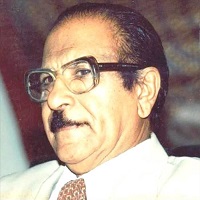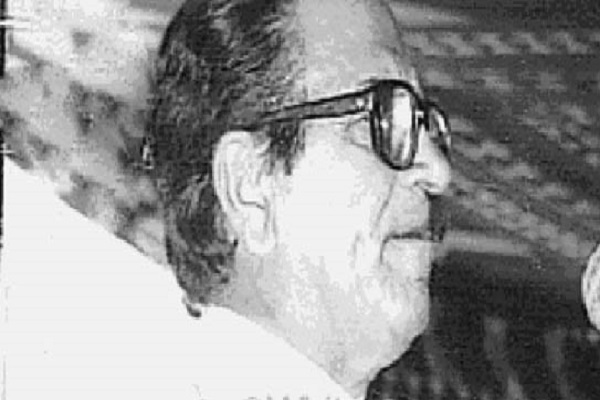Nabi Bakhsh Baloch was a writer and research scholar and was known as ‘Moving-Library’ in Sindh. He contributed his wisdom and knowledge to several disciplines that include Civilization, Culture, Islamic, Musicology, Anthropology, Archeology, Folklore, Education, and History.
Baloch published his works in Sindhi, Urdu, Persian, Arabic, and English; he wrote articles on Baluchistan and Sindh that appeared in the 15th Edition of the ‘Encyclopedia Britannica’ in 1972. Nabi Bakhsh published and compiled a Sindhi dictionary entitled ‘Jami’a Sindhi Lughaat’ in 5-volumes revised later in 3-volumes.
He had compiled Urdu to Sindhi and Sindhi to Urdu dictionaries along with Ghulam Mustafa Khan. This article contains all the information about him, including Nabi Bakhsh Baloch Biography.
| Title | Description |
|---|---|
| Personal | |
| Name: | Nabi Bakhsh Baloch |
| In Urdu: | نبي بخش خان بلوچ |
| Famous As: | Scholar and Writer |
| Nationality: | Pakistani |
| Education: | PhD |
| Religion: | Islam |
| Profession: | Research Scholar and Writer |
| Awards : | He received many awards |
| Contributed Articles: | ‘Sindh’ and ‘Baluchistan’ |
| Published Over: | 100 works in English, Arabic, Persian, Urdu, Sindhi, and Saraiki |
| Knowledge: | history, education, folklore, archaeology, anthropology, musicology, Islamic culture, and civilization. |
| Born | |
| Date: | 16th December 1917 |
| Place: | Jaffer Khan Laghari village, Taluka Sinjhoro, Sanghar District, Sindh, Pakistan |
| Family | |
| Parents: | Ali Mohammad Khan Laghari Baloch |
| Relatives: | Wali Mohammad Khan (Uncle) |
| Died | |
| Date: | 6th April 2011 |
| Rest Place: | Hyderabad, Sindh, Pakistan |
| Cause of Death: | Cardiac Arrest |
Table of Contents
Nabi Bakhsh Baloch Biography
Though he belonged to an under-developed district Sanghar, he made splendid contributions to history, folklore, literature, and education. He was s scholar and historian par excellence and produced several notable works. He didn’t limit himself to the Education Department of Sindh University’s management and conducted extensive research in archaeology, linguistics, and history.
Nabi Bakhsh studied old manuscripts on biographies, classical-literature, history, and some other read-worthy documents, conducted research on them, wrote explanatory notes and addendums on them, and asked Sindhi Adabi Board to publish them. In poetry, his work wasn’t restricted to Bhattai but also worked on classical poets’ poetry.
Moreover, he wrote the explanatory notes and corrected their scripts later published by the Sindhi Adabi Board. When he was at the peak of his academic career, the federal Government assigned his other works. He got designated as Sindh University’s Vice-Chancellor in 1973 and served at this post until 1976.
Baloch Date of Birth
He opened his eyes on 16th December 1917 in Jaffer Khan Laghari Village, Taluka Sinjhoro.
Education of Baloch
He received early education from a teacher at Village Palio Khan Laghari and, for secondary education, joined Naushero Feroz Madrasah. In 1936 he completed his Matriculation and got enrolled at Bahaudin Degree College in Junagarh in 1941. After this, he took admission to Aligarh Muslim University.
Upon returning to Sindh, he started teaching Arabic at S.M. Law College and simultaneously applied for a U.S. scholarship to receive higher education. In 1946 he moved to the U.S. and enrolled at Teachers-College Columbia University to pursue a Master’s degree in ‘Education’ and, in 1949, secured a Doctorate in Education.
Nabi Bakhsh Baloch became part of the U.N.’s internship program after completing his thesis on the ‘Teacher’s Education.’ Due to his exemplary work and contributions at U.N., he offered a permanent position, but he refused and returned to Pakistan.
Career
Joined MoIB
He joined MoIB (Ministry of Information & Broadcasting) in 1950 as an officer on the special-duty. He made a trend in Govt publications and also in broadcasting on the radio.
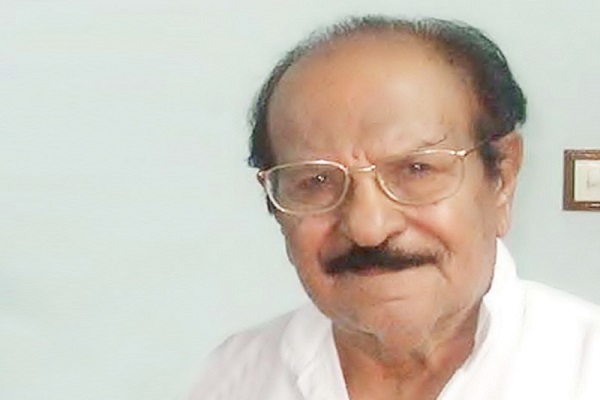
Initiation of a Monthly Magazine
He started a monthly-magazine ‘Naeein Zindagi.’ He created several other Publications about his country & its 5-provinces to educate the general public and oppose propaganda from another side of the border. Additionally, he promoted folk culture and folk music of all provinces via radio.
Services to Sindh University
He was designated as Public-Relations Officer in 1951 for the Pakistani Mission in Damascus. However, he preferred to play his role in establishing Sindh, University in Hyderabad and came back to Pakistan for this high cause. He became 1st professor at this University and established 1st ever Education Department in Pakistan.
He was awarded National Merit-Award in 1973 and got promoted to the post of University’s Vice-Chancellor. During his stay at University, Baluch was in charge of editing monographs like Journal of Research, Journal of Science, the report on education provided in Sindh, Teaching Methods, and many publications.
He played a fundamental part in establishing several institutions associated with Sindh University. In 1953 the department of ‘Sindhi’ started working.
Services to Sindhi Academy
The Sindhi Academy that he initiated earlier was transformed into Sindhology Institute. He prepared a draft of the plan to set up an institute at the University of Sindh, and Education Secretary approved this draft. Baloch performed the duties of a director, and upon his insistence, the academy was renamed as an institute.
He then moved this Institute from old-campus to new-campus, comprising auditorium, heritage gallery, museum, and library. The library is functioning to preserve and collect materials and books on province Sindh and then publish them. He started the publication of the Institute’s monthly journal entitled ‘LLmee Aa’eeno.’
Conveyed Shah Lateef’s message
During his stay at University, Nabi Bakhsh Baloch guided many institutions in Sindh. He served as Secretary of Bhitshah Cultural-Center and arranged literary seminars during annual functions. Nabi Bakhsh fostered a rural-cultural milieu, conveying Shah Abdul Lateef’s message. He introduced and edited 1st biographical work written on Shah Abdul Lateef by Abdul Hussein Khan.
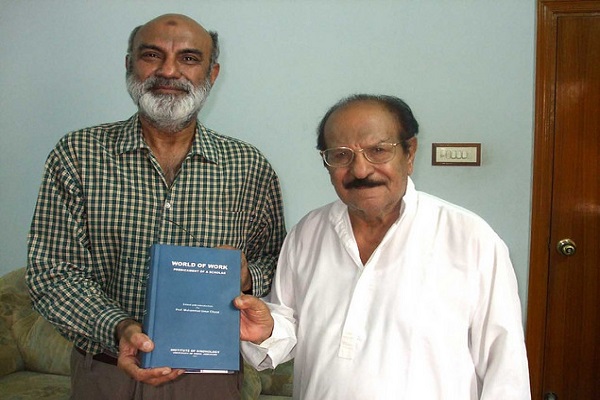
Establishment of Mehran Arts Council
As honorary secretary of Mehran Arts Council, he made great efforts for its establishment; he made its scheme, convinced authorities to provide grants, purchased a plot for establishing council in Lateefabad, and succeeded in constructing a building.
Preserved Historical Buildings
He influenced the Archaeological Department’s decisions and cooperated in starting excavations at Talpur, Umarkot, Mansura, and Bhanbhore Museum. He convinced the Archaeological Department to set up their zonal-office at Hyderabad.
Under his chairmanship, Hyderabad’s wall of the fort, Mosque of Miyan Yaar Muhammad, Mir Shahdad Khan’s Tomb, Graveyards at Mian Wahyoon and Landhi, and several other historical spots were preserved at Nabi’s behest. On an international level, he worked with Dr. Knez in establishing the ‘Sindhi House of Pakistan’ at Washington’s Smithsonian Institute.
Services as Sindh University’s Vice-Chancellor
During his time at Sindh University as Vice-Chancellor, he arranged an International Conference entitled ‘Sindh Through Centuries’ from 2nd to 7th March 1975 at Karachi.
Services to Federal Government
Federal Govt of Pakistan asked for his services from Jan 1976 to Jun 1989, on orders of then PM Zulfiqar Bhutto. He was designated as Secretary for Archaeology, Culture, Sports & Tourism.
The critical projects he guided and supervised include the Celebrations of the founder of Pakistan, Quaid-e-Azam, and Allama Iqbal.
Services as National Commission’s Chairperson
He was designated as Chairperson of National Commission on Cultural and Historical Research from 1st July 1979 to Oct 1979, and during his tenure, this Institute started many projects including:
- Published ‘Pakistan Journal of History & Culture’
- ‘Chachanama’ the significant edition with text in Persian, English translation & detailed notes and Introduction
- Islam’s Advent in Indonesia
- Diary of Maulana Ubaidullah Sindhi During his stay in Kabul Afghanistan
A six-volume consisting project in which architectural moments of the following were studied:
- Lahore
- Multan
- Uch
- Thatta
- Pakistan
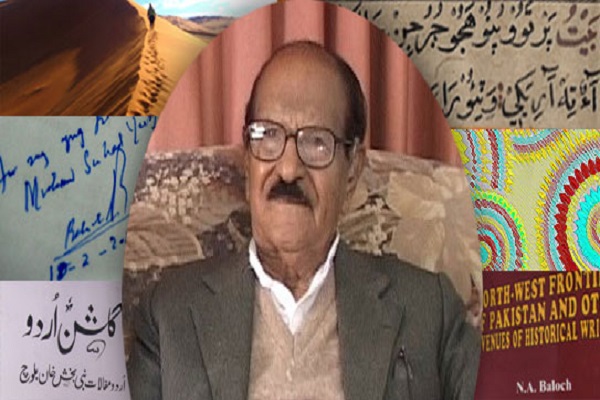
Project on Shah Abdul Lateef’s Poetry
In 1989 he formally started rearranging, editing, and compiling a simple text of Poetic Compilation of Abdul Lateef ‘Shah Jo Risalo.’It was a massive and huge project, including detailed research & deep-rooted apprehension of great poets’ philosophy and the expertise in the Sindhi dialect itself.
Chairperson of Sindhi Language Authority
Sindh Government established the Sindhi Language Authority in 1991, and he got an invitation to join it as chairperson. He served in this institution for Twenty-Seven months, and during this period, he published numerous works on multiple topics relevant to the promotion and teaching of the Sindhi dialect.
Participation in UNESCO and U.N. Forums & International Conferences
- In summer 1948, he participated in the internship program of U.N.
- From 1948 to 1949, he remained an accredited speaker of U.N.
- Member of Pakistani Delegation to UNESCO Regional-Seminar on Primary Education held in South Asia in 1956
- Member of Pakistani Delegation to India-Pakistan Cultural Conference in New Delhi in 1962
- Pakistan Delegate to UNESCO Meeting of the Experts in Teacher-Training from all Asian Countries in Manila in 1963
- Participated in UNESCO Expert-Committee on Teacher Education in Dec 1967 in Paris
- Delivered several lectures at Higher Islamic-Educational Institutions in 1977 in Indonesia at the Indonesian Government’s invitation
- Member of Pakistani Delegation to Twentieth UNESCO General-Conference held in Nov 1978 & April 1979.
- Member of International Editorial-Committee on the ‘History of the Central Asian Civilization’
Nabi Bakhsh Baloch Awards
- Sitara-e-Imtiaz
- Tamgha-e-Imtiaz
- Pride of Performance
- Sitara-e-Quaid-e-Azam
- I’zaz-e-Kanwal
- Shah Latif & Mysticism Award
- Litt
- Kamal-e-Fun Award
- Doctorate Degree of Educational Management-Honors Causa
- Hilal-e-Imtiaz
Nabi Bakhsh Baloch Publications
- Sindhi Jami’aa Lugha’at
- Sindhi Lok Kahaniyon
- Munaqibaa
- Madahoon Ain Munaajaatoon
- Roshni
- Molood
- Moajiza
- Teeh Akhriyoon
- Jang Naama
- Hafta Deinh Ratyon Ain Mahina
- Munira
- Waqati Bait
- Sindhi Senghaar
- Door
- Gujhartoon
- Paroliyoon Dunoon, Muamaoon Ain Bol
- Lok Geet
- Bait
- Geech
- Kafiyoon
- Narr Ja Bait
- Mashoor Sindhi Qissa
- Rasmo Riwaj Ain Sanwan Sath
- Kulyaat-e-Hamal
- Sindhi Hunr Shairy
- Mubeen Shah Jo Kalaam
- Miyen Shah Inat Jo Risalo
- Shah Lutfullah Qadri Jo Kalaam
- Khalifa Nabi Bakhsh Laghari Jo Risalo
- Nawab Wali Muhammad Laghaari Jo Kalam
- Kulyaat-e-Sangi
- Lakhon Phulani
- Boylan Ja Bola
- Ragnamo
- Kazi Qazan Jo Kalaam
- Soomran Jo Daur
- Sindhi Boli Ain Adab Jee Tareekh
- Sindhi Mosque Je Mukhtasir Tareekh
- Gadahn
- Sindhi Sooratkahti Ain Khataati
- Sindh Mein Urdu Shairy
- Molana Azaad Subhani
- Deewan-e-Shaq-e-Afza
- Deewan-e-Matam
- Talaba Aur Taleem
- The advent of Islam in Indonesia
- Sindh: Studies Historical
- Traditional Arts and Crafts of Hyderabad Region
- Musical Instruments of Lower Indus-Valley of Sindh, 1966,
- Gosha-e-Baloch
- Chachnama
- Baqiyaat az Kalhora
- Beglar Naama
Nabi Bakhsh Baloch Death
He passed away on 6th April 2011 at Hyderabad, Sindh. 3-daughters and 5-sons survive him. Imdad Hussaini, G.Allana, Sassui Palijo, Pir Mazhar-ul-Haq attended his funeral.
Legacy
Pakistan Academy of Letters organized an event to pay him tributes. Sindh Adabi Sanghat’s Mir Mukhtar Talpur said that Nabi worked keenly and dedicatedly to document every minor detail about Sindh. He recalled Baluch’s sincere efforts in preserving the folklore and culture of Sindh.
He further stated that Baluch visited Sindh’s every corner to protect its culture and history. Chairperson of Pakistan Academy of Letters, Fakhar Zaman, called Baluch’s death the most significant loss for Pakistan’s literature. Qasim Bughio, Chairperson of Pakistan Academy of Letters, paid him rich tributes on Baluch’s 100th birthday.
